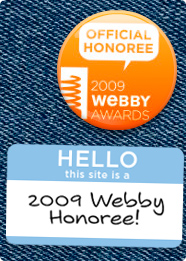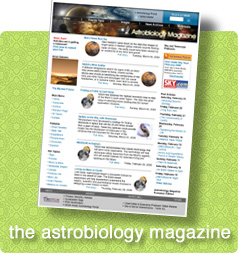
"Can we detect microbial or other non-intelligent life on planets outside of our solar system?"
-
NAI Team Seminars Recorded and Available Online
A series of virtual seminars highlighting the work of the NAI’s fourteen teams concluded on April 27, 2009. In successive seminars held two per week over a period of two months, each team presented their science, education and outreach and other activities. The seminars were open to all, and participants had the option of joining in by phone and web, or by videoconference. The seminars attracted audiences that ranged from ~50-80 people each, and were recorded and archived on the NAI website. The seminars may be downloaded as podcasts or viewed as web recordings that play...
Source: [Link]
-
NAI Ames Research Center Team Launches New Website
The NAI Ames Research Center Team announces the launch of their new website at http://www.amesteam.arc.nasa.gov. The site contains news, highlights, a member directory, research overviews, E/PO information and more.
-
Student Astronomers Earn Top Honors in State Science Fair
NAI’s University of Hawai’i Team has conducted the Hawai’i Student-Teacher Astronomy Research (HI STAR) program for the past four years and counting, supporting middle and high school students to carry-out astronomy research projects under the mentorship of NAI scientists and other astronomers. Teams of 3-4 students and their science teacher come to UH for a week in the summer for background training, project selection, and mentor-matching. Through lectures, demos, and hands-on activities, the students learn astronomical concepts such as spectroscopy, image processing, and remote observation. Projects are selected, and students make plans with...
-
Planetary Science Decadal Survey
Dear Colleague:
This is the first of what will be a regular series of newsletters to the astrobiology community regarding the 2009-2011 Planetary Science Decadal Survey. We all get too much email, so I’ll try to keep these concise!
The key points in this newsletter are these:
1) The decadal survey will establish the priorities for planetary exploration in the U.S. for the coming decade.
2) Astrobiology is a major crosscutting theme of NASA’s planetary science activities and a central facet of the survey’s scientific scope.
3) The process is just getting started, and will...Source: [National Academies Space Studies Board]
-
Evidence for the Great Oxidation Event Challenged
The timing of the rise of oxygen in Earth’s atmosphere is a key question in astrobiology. It is coupled not only to the question of when organisms capable of oxygenic photosynthesis first evolved on Earth, but also what signs of life might be found on young Earth-like planets around other stars.
Members of NAI’s Penn State and Carnegie Institution of Washington Teams report in the current issue of Science that certain sulfur isotopes found in many sedimentary rocks older than 2.4 billion years may not be the result of photochemical reactions in an oxygen-free atmosphere as previously thought....
-
NASA Astrobiology Website is Official Webby Honoree
The NASA Astrobiology Program website has been selected as an Official Honoree of the 13th annual Webby Awards! The International Academy of Digital Arts and Sciences presents Webby Awards and names Official Webby Honorees in 70 categories spanning art, health, music, and science. Of nearly 10,000 entries to the competition, fewer than 15% were selected as honorees, and the NASA Astrobiology Program website shares this year’s distinction in the category of Website/Science with ten other websites including the likes of Seed Magazine, the California Academy of Sciences, and...
-
Elemental Evolution
Ariel Anbar of NAI’s ASU Team share his thoughts on fossils, Star Trek, and life on Mars with May Copsey of RSC Publishing...
 Planetary Science Decadal Survey
Planetary Science Decadal Survey 2008 Annual Report
2008 Annual Report- NASA Selects New Science Teams for Astrobiology Institute
 NAI Team Overview Presentations
NAI Team Overview Presentations- 2008 Astrobiology Roadmap
- 2009 Santander Summer School
- NRC Assessment of the NASA Astrobiology Institute, 2008
- Astrobiology Small Payloads Workshop Report
- Seminar Series Podcasts
- Astrobiology Primer
- NASA Postdoctoral Program Selections
- NPR's Science Friday on Origins of Life and the Universe
- NAI Team Overview Seminars Continue in April
- Recently Published Research from the NAI
- 2009 Santander Summer School: NAI Scholarship Deadline Extended to April 24th
- 21st Annual Planetary Science Summer School
- Invisible Yellowstone
- Beyond the Edge of the Sea Traveling Art Exhibition
- New Frontiers Announcement of Opportunity
 April 9, 2009
April 9, 2009 





